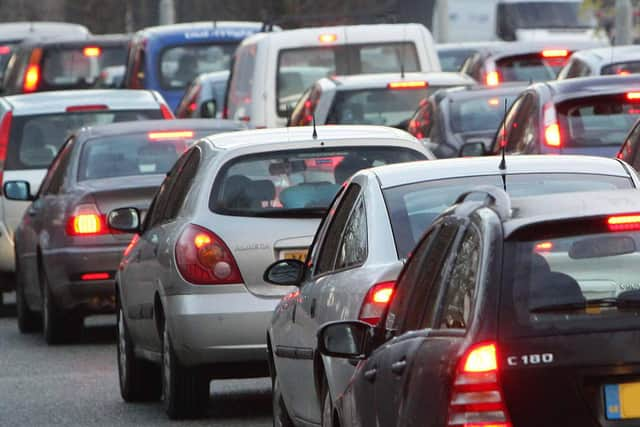The worst-hit Sheffield A-road for delays has been revealed as figures show problem is worsening
and live on Freeview channel 276
The worst-hit Sheffield A-road for delays have been revealed, as newly-released figures show the issue is continuing to get worse.
Department for Transport figures show drivers travelling on local A-roads in Sheffield were delayed by 54 seconds per mile on average when compared to the pace they would have made if driving at the speed limit in free-flowing conditions.
This was up from 51 seconds per mile the year before.


Advertisement
Hide AdAdvertisement
Hide AdIn 2019, before the coronavirus pandemic which saw traffic levels plummet, the average delay for motorists in the area was 56 seconds per mile.
The A621, which spans Abbeydale Road, Abbeydale Road South, Baslow Road and Sheffield Road, saw the greatest delays in Sheffield at one minute and 17 seconds per mile.
Nationally, drivers were held up by 48 seconds per mile on local A-roads – the highest figure since 2019.
The figures cover only A-roads, which account for around 10 per cent of England's highway network but carry around a third of all traffic.
Advertisement
Hide AdAdvertisement
Hide AdMeanwhile, factoring in motorways and major A-roads, drivers across the country were delayed by a record 11 seconds per mile.
Speeds were measured using samples of vehicles recorded at different times of the day.
RAC head of policy Simon Williams said: "It’s very concerning to see delays on our most important roads increasing to above pre-pandemic levels and average speeds are dropping.
Advertisement
Hide AdAdvertisement
Hide Ad"With more people than ever working from home at least part of the week and no growth in the number of cars on the road since then, we’re struggling to see what the cause can be other than roadworks."
He added: "Given today’s disappointing findings, it’s more important than ever that National Highways, which is responsible for the strategic road network, is given sufficient funds in the next five-year road investment settlement to tackle these issues head-on."
The data also shows the average speed drivers travelled along local A-roads, with the national average falling to 23 miles per hour last year, the lowest figure since before the pandemic.
In Sheffield, motorists averaged 20.3 mph – up marginally from 19.8 in 2019.
Advertisement
Hide AdAdvertisement
Hide AdA Department for Transport spokesperson said: "This Government backs drivers, which is why we’re getting on with our plan to invest over £24 billion into our roads to reduce congestion, improve road safety and grow the economy.
"As well as investing more into new and improved roads, we have a plan for drivers to slam the brakes on anti-driver measures and help keep our country moving."
Comment Guidelines
National World encourages reader discussion on our stories. User feedback, insights and back-and-forth exchanges add a rich layer of context to reporting. Please review our Community Guidelines before commenting.